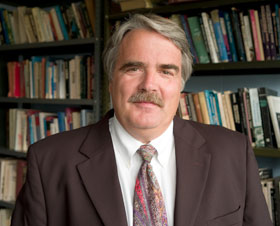  |
| HOME | THIS ISSUE | CALENDAR | GRANTS | BACK ISSUES | < BACK | NEXT > |
Political scientist brings philosophical issues home to studentsby Sherry Fisher - September 10, 2007 | ||||
| Richard Hiskes teaches his political theory course by having students participate in what is called “The Great Conversation.” “The term was coined by Machiavelli, but it began with Plato and the classical Greeks,” says Hiskes, a professor of political science. “It’s about having students look at the real world around them, and through a process of discussion, find out what the persistent philosophical issues are that our everyday events manifest.” What is Hiskes’ teaching style? “I walk and talk,” he says. It doesn’t matter whether it’s a class of 20 or 200; he tries to make eye contact with every student. “I want to make them feel like they’re having a small conversation.” He doesn’t use PowerPoint or other technology, but his students don’t seem to mind. For 27 years, his student evaluations have been at the highest levels of the department and college. So it’s not surprising that he was given the UConn Alumni Association’s 2007 Faculty Teaching Award for Undergraduate Teaching. Hiskes specializes in modern and contemporary political thought, democratic theory, environmental ethics, and human rights theory. “We might be reading Plato, Marx, or Machiavelli, but I try to get students to see the theory-ladenness of their everyday lives,” Hiskes says. “For instance, a major philosophical issue that Americans think about is the nature of consent. So I’ll ask the students what counts as consent.” He describes how he brought the issue close to home during a class discussion about expressed and tacit consent: “It turns out to be a cold day, and at noon you go back to your dorm to get your sweater,” he told the class. “Your sweater’s not there. Your roommate comes in and she’s wearing it. You say, ‘I never said you could wear my sweater.’ Your roommate says, ‘Yes, but you left your closet open so I just assumed that it was okay.’ That’s a tacit consent situation,” Hiskes says. “Conceptual issues of consent, democracy, justice, liberty, rights and responsibility, and political obligation are as alive today as in ancient Athens,” he says.
“Students are amazed when they realize that they’ve been grappling with major, timeless philosophical questions their whole lives. And they thought they were just arguing with their parents.” Hiskes says he tells students: “I promise you this class will make you realize you’re in college. You may not like it that much. You may think it’s boring reading. But it doesn’t mean it’s not worthwhile.” He enjoys teaching freshmen. “I find it’s helpful. You can’t lose the ability to talk about sophisticated, highbrow research simply, in ways that ordinary people can understand it, without losing your ability as a researcher,” he says. “I always talk about my research in my classes. In some courses, I have students read articles I’ve written, to see what they think.” Hiskes says he has concerns about higher education: “Some universities are in danger of losing the intellectual side of what they do. A university is a place where there is a huge amount of human knowledge in every area. Universities are the depositors and distributors of the intellectual legacy of the species. UConn has done better than most.” When students ask which courses they should take, Hiskes tells them: “These four years are probably the only time in your life to develop interests that will carry you for the rest of your life. You need to stretch while you’re here, and find interests that will sustain you. Take a course in Shakespeare or movie-making, or something you wouldn’t normally take. “We have to be the place where our students come to be intellectually stimulated.” he says. Hiskes’ current research focuses on environmental human rights and justice across generations. He is working on a new book on environmental human rights. |
| ADVANCE HOME UCONN HOME |

